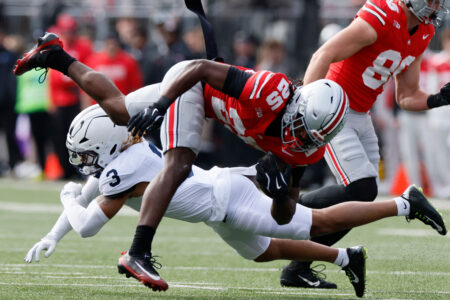Thu. 9:28 a.m.: Iraqi lawmakers demand US withdrawal after Trump visit

President Donald Trump and first lady Melania Trump greet members of the military as they arrive for a hanger rally Wednesday at Al Asad Air Base, Iraq. In a surprise trip to Iraq, President Donald Trump defended his decision to withdraw U.S. forces from Syria where they have been helping battle Islamic State militants. (AP Photo/Andrew Harnik)
BAGHDAD (AP) — Iraqi lawmakers today demanded U.S. forces leave the country in the wake of a surprise visit by President Donald Trump that politicians denounced as arrogant and a violation of Iraqi sovereignty.
Politicians from both blocs of Iraq’s divided Parliament called for a vote to expel U.S. troops and promised to schedule an extraordinary session to debate the matter.
“Parliament must clearly and urgently express its view about the ongoing American violations of Iraqi sovereignty,” said Salam al-Shimiri, a lawmaker loyal to the populist cleric Moqtada al-Sadr.
Trump, making his first presidential visit to troops in a troubled region Wednesday, said he has no plans to withdraw the 5,200 U.S. forces in the country.
Trump staunchly defended his decision to withdraw U.S. forces from neighboring Syria despite a drumbeat of criticism from military officials and allies who don’t think the job fighting Islamic State militants there is over.
Iraq declared IS defeated within its borders in December 2017, but Trump’s trip was shrouded in secrecy, which has been standard practice for presidents flying into conflict areas.
Air Force One, lights out and window shutters drawn, flew overnight from Washington, landing at an airbase west of Baghdad in darkness Wednesday evening. George W. Bush made four trips to Iraq as president and President Barack Obama made one.
Containing foreign influence has become a hot-button issue in a year that saw al-Sadr supporters win the largest share of votes in May elections. Al-Sadr has called for curbing U.S. and Iranian involvement in Iraqi affairs.
U.S. troops are stationed in Iraq as part of the coalition against the Islamic State group. American forces withdrew in 2011 after invading in 2003 but returned in 2014 at the invitation of the Iraqi government to help fight the jihadist group.
But after defeating IS militants in their last urban bastions last year, Iraqi politicians and militia leaders are speaking out against the continued presence of U.S. forces in Iraqi soil.
Qais Khazali, the head of the Iran-backed Asaib Ahl al-Haq militia that fought key battles against IS in north Iraq, promised on Twitter that Parliament would vote to expel U.S. forces from Iraq, or the militia and others would force them out by “other means.”
Khazali was jailed by British and U.S. forces from 2007 to 2010 for managing sections of the Shia insurgency against the occupation during those years.
His militia is represented in Parliament by the Binaa bloc, a rival coalition to al-Sadr’s Islah. Binaa favors close ties with Iran and is aligned with Tehran on regional political issues.
Trump spent three hours at a U.S. air base meeting with American troops during his visit. The president defended his decision to withdraw 2,000 U.S. forces from neighboring Syria, saying the U.S. military had all but eliminated IS-controlled territory there.
He said the decision to leave Syria showed America’s renewed stature on the world stage and his quest to put “America first.”
“We’re no longer the suckers, folks,” Trump told U.S. servicemen and women at al-Asad Airbase in western Iraq, about 100 miles west of Baghdad. “We’re respected again as a nation.”
The decision to pull U.S. forces from Syria, however, stunned national security advisers and U.S. allies and prompted the resignations of Defense Secretary Jim Mattis, who was not on the trip, and the U.S. envoy to the coalition fighting the Islamic extremist group. The militant group, also known as ISIS, has lost nearly all its territory in Iraq and Syria but is still seen as a threat.
Trump left Iraq without meeting any Iraqi officials, though he spoke to Prime Minister Adel Abdul-Mahdi by phone.
The prime minister’s office said in a statement after Trump’s visit that “differences in points of view” over arrangements led to a face-to-face meeting between the two leaders to be scrapped.
Al-Shimiri said Trump’s visit “violated several diplomatic norms.”



